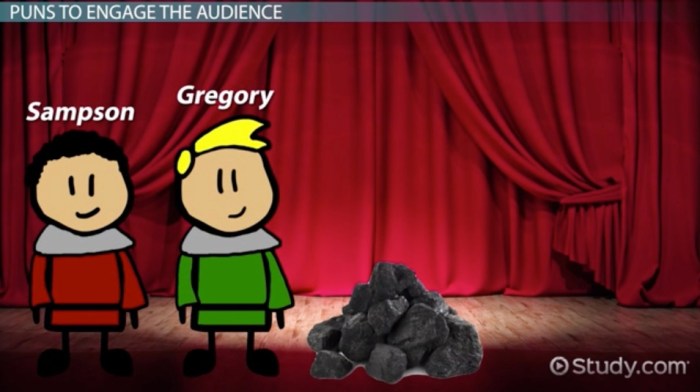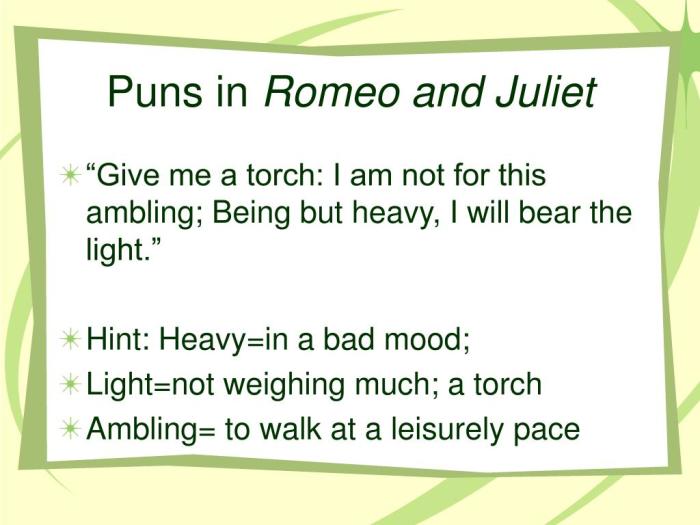Pun Romeo and Juliet Act 3 sets the stage for this enthralling narrative, offering readers a glimpse into a story that is rich in detail and brimming with originality from the outset. The play’s iconic puns, particularly those uttered by the witty Mercutio, add a layer of humor and complexity that enhances the overall experience.
Mercutio’s puns are not merely linguistic gymnastics; they serve as a reflection of his character and the themes of the play. Through his wordplay, Mercutio reveals his sharp wit, his irreverent nature, and his deep understanding of the human condition.
Introduction

Act 3 of Romeo and Juliet is a turning point in the play, as the feud between the Montagues and Capulets escalates and the lovers’ relationship is put to the test. Puns, a literary device that plays on the multiple meanings of words, are used extensively in this act to create humor, foreshadow events, and reveal the characters’ inner thoughts and feelings.
The use of puns in Act 3 highlights the play’s themes of love, fate, and the power of words. By using puns, Shakespeare creates a sense of irony and foreshadowing, hinting at the tragic events that are to come.
Puns in Act 3
- When Mercutio tells Romeo, “If thou art a man, show thyself,” he is using a pun on the word “man” to refer to both Romeo’s masculinity and his human nature.
- When the Nurse tells Juliet, “Your love says like an honest gentleman,” she is using a pun on the word “honest” to refer to both Romeo’s sincerity and his social status.
- When Friar Laurence tells Romeo, “These violent delights have violent ends,” he is using a pun on the word “violent” to refer to both the intensity of Romeo and Juliet’s love and the tragic outcome that awaits them.
Pun Usage by Mercutio

Mercutio, a close friend of Romeo, is renowned for his witty and playful nature. Throughout the play, he frequently employs puns, adding humor and wordplay to the tragic events unfolding around him. In Act 3, Mercutio’s puns serve several purposes, including providing comic relief, highlighting his quick wit, and foreshadowing the tragic events to come.
Specific Puns in Act 3
In Act 3, Scene 1, Mercutio engages in a verbal duel with Tybalt, using puns to both insult and outwit his opponent. For instance, when Tybalt challenges Romeo to a duel, Mercutio responds with the pun, “Tybalt, the rat-catcher, will catch thee soon!” This pun humorously equates Tybalt to a rat-catcher, implying that he is a pest who will be dealt with swiftly.
Furthermore, Mercutio’s use of the word “catch” has a double meaning, as it can also refer to the act of catching someone in a trap. This wordplay adds an extra layer of humor to the exchange.
Another notable pun occurs in Act 3, Scene 2, when Mercutio is mortally wounded by Tybalt. As he lies dying, Mercutio utters the famous line, “Ask for me tomorrow, and you shall find me a grave man.” This pun on the word “grave” foreshadows Mercutio’s own death, as well as the tragic events that will befall Romeo and Juliet.
The word “grave” has a dual meaning, referring both to a serious or somber person and to a burial site. Mercutio’s use of this wordplay highlights the irony of his situation and adds a touch of dark humor to the tragic scene.
Mercutio’s puns in Act 3 not only provide comic relief but also reveal his sharp wit and quick thinking. His ability to craft puns even in the face of danger demonstrates his resilience and his determination to maintain a sense of humor in the face of adversity.
Moreover, his puns foreshadow the tragic events to come, adding an element of irony and complexity to the play.
Pun Usage by Other Characters: Pun Romeo And Juliet Act 3
In addition to Mercutio, other characters in Act 3 of Romeo and Juliet also employ puns to add humor and depth to the play.
Nurse
The Nurse, Juliet’s confidante, uses puns to lighten the mood and provide comic relief in the midst of the play’s tragic events.
In Act 3 of Romeo and Juliet, the tension rises as the lovers face obstacles. To explore the historical context of the play, check out this informative resource on ancient India . As we delve deeper into the tragic events of Romeo and Juliet, this map provides insights into the ancient world that influenced the play’s setting and characters.
- “My fan, Peter.” (Act 3, Scene 5) – A play on words referring to both a hand fan and Peter’s occupation as a fan bearer.
- “Thou art as hot a Jack in thy mood as any in Italy.” (Act 3, Scene 5) – Compares Romeo’s fiery temper to a jack-in-the-box.
Romeo, Pun romeo and juliet act 3
Even the heartbroken Romeo resorts to puns in moments of intense emotion.
- “I have lost myself: I am not here; this is not I.” (Act 3, Scene 3) – Romeo puns on the phrase “beside myself” to express his feelings of being lost and out of control.
- “Doth not rosemary and Romeo begin both with a letter?” (Act 3, Scene 2) – Romeo plays on the similarity in the first letters of his name and the herb rosemary to hint at his fate.
Purpose and Effect
The use of puns by various characters in Act 3 of Romeo and Juliet serves multiple purposes.
- Comic Relief:Puns provide a moment of levity and laughter amidst the play’s tragic events.
- Characterization:They reveal aspects of the characters’ personalities and emotions.
- Symbolism:Puns can foreshadow future events or symbolize the characters’ inner struggles.
- Audience Engagement:Puns help to keep the audience engaged and entertained, even during emotionally intense scenes.
Impact of Puns on Characterization

Puns play a significant role in characterizing Mercutio and other characters in Romeo and Juliet. They reveal aspects of their personalities, motivations, and relationships.
Mercutio’s Wit and Sarcasm
Mercutio’s use of puns highlights his quick wit and sarcastic nature. Through his puns, he pokes fun at others, including Romeo and Tybalt, often using wordplay to insult or mock them. For example, when Tybalt challenges Romeo to a duel, Mercutio quips, “Tybalt, the rat-catcher, will catch thee by the nose.”
This pun not only insults Tybalt but also reveals Mercutio’s disdain for him.
Romeo’s Immaturity
In contrast to Mercutio’s wit, Romeo’s use of puns often reveals his immaturity and naivety. His puns tend to be more forced and less clever, highlighting his lack of experience and sophistication. For example, when he first meets Juliet, he says, “Did my heart love till now? For I ne’er saw true beauty till this night.”
This pun is not particularly clever or witty, but it does reveal Romeo’s youthful infatuation with Juliet.
Nurse’s Practicality
The Nurse’s use of puns also contributes to her characterization. Her puns are often practical and down-to-earth, reflecting her no-nonsense personality. For example, when she tells Romeo that Juliet is dead, she says, “I saw the wound, I saw it with mine eyes—God save the mark!—here on her breast.”
The pun on “God save the mark” is a common expression used to ward off evil, but in this context, it also reveals the Nurse’s practical nature and her concern for Juliet’s well-being.
Symbolism and Meaning of Puns

The puns in Act 3 of Romeo and Juliet are not merely comedic devices; they carry symbolic meanings and reflect the play’s themes and conflicts.
The pun on “farewell” (fare-well/fair well) foreshadows the tragic events to come. When Romeo says, “Thus with a kiss, I die,” he is referring to the kiss he has just shared with Juliet, but the word “die” also foreshadows his actual death later in the play.
Puns and the Theme of Love
Puns also reflect the play’s theme of love. The pun on “love” (love/leave) in the line “If you love me, leave me” suggests that love can be both a source of joy and pain.
Puns and the Conflict between the Montagues and Capulets
The puns also reflect the conflict between the Montagues and Capulets. The pun on “civil” (civil/civile) in the line “If you do wrong, I’ll make you civil” suggests that the conflict between the two families is not merely a personal one, but a social one as well.
Essential FAQs
What is the significance of puns in Romeo and Juliet Act 3?
The puns in Act 3 add humor, reveal character traits, and foreshadow future events.
Who is the main punster in Act 3?
Mercutio is the primary punster in Act 3, known for his quick wit and clever wordplay.
How do puns contribute to the characterization of Mercutio?
Mercutio’s puns reflect his intelligence, humor, and irreverence, adding depth to his character.